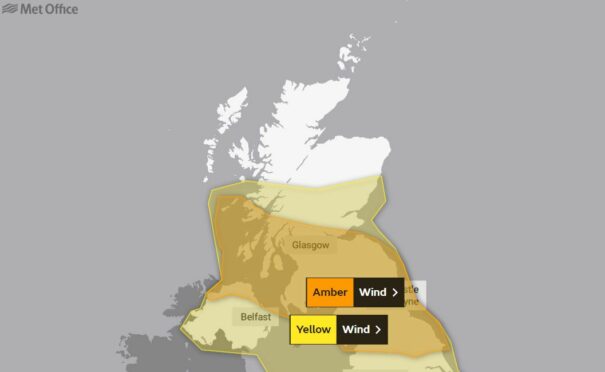
Rail services across Scotland have been suspended as Storm Dudley brings gusts of up to 90 miles per hour.
ScotRail wound down almost all services from 4pm on Wednesday amid fears of falling trees and blowing debris.
Ferries have also been severely disrupted, with 20 of the 29 routes experiencing cancellations.
The Met Office issued an amber weather warning active from 4pm on Wednesday across central and south Scotland and the north of England, downgrading to a yellow warning at midnight.
Storm Dudley is due to be followed by Storm Eunice later this week, which could bring snow.
Deputy First Minister John Swinney warned Scots the coming days will be “very challenging” as a result.
He said the weather could cause disruption to travel and power supplies as well as danger from falling trees.
“We expect another period of disruption this week, with Storms Dudley and Eunice set to bring strong winds to Scotland,” he said.
“High winds may cause issues on roads and bridges, disruption to power supplies and danger from falling trees. We would urge everyone to plan their journeys in advance, exercise caution on the roads, and follow the latest travel advice.”
Following a meeting of the Scottish Government’s Resilience Room, the Deputy First Minister said they would continue to monitor the situation as the storms approach.
Resilience meeting @scotgov just completed. The next few days will be very challenging with #StormDudley. Please see @ScotRail plans and follow advice there is a high risk of disruption to travel. Please #StaySafe https://t.co/pKdxFzJDNB
— John Swinney (@JohnSwinney) February 15, 2022
ScotRail announced on Tuesday that services in areas threatened by severe weather would end at 4pm on Wednesday for safety reasons.
“Scotland is bracing itself for Storm Dudley,” the rail operator said on Twitter.
“The welfare of our customers and staff is most important, so for safety reasons most ScotRail train services will shut down from 1600 on Wednesday.”
Services in the far north, Kyle of Lochalsh, and Aberdeen-Inverness lines will continue to run as usual because the areas are outside the boundaries of the weather warning.
Robert Morrison, ferry operator CalMac’s director of operations, said: “This will be the fourth week of extreme and unprecedented weather disruptions.
“We shared last week that this is taking place when other factors are affecting our service – including technical faults, overhaul, and the continuing but lesser effects of Covid-19.
“We know we cannot control every factor, but we want to stress to our customers again that we do understand how much you and the communities we serve rely on our services.
“Ensuring ferries work as they should is our priority and we are working hard to ensure we limit the impact of this upcoming period of disruption as much as we can and protect the lifeline service we deliver.”
‘Treacherous’ conditions
The RNLI warned adverse weather conditions could make seas “treacherous”, urging people to take extra care in coastal areas.
“The expected storms could make our seas treacherous, increasing the risk for those visiting the coast around the UK and Ireland,” RNLI national water safety partner, Samantha Hughes, said.
“In a normal year, around 150 people lose their lives at the coast and we know that more than half of those never intended to be in the water.
“So, whether you are walking, running or cycling at the coast, please be extra responsible and avoid taking unnecessary risk or entering the water.
“In particular, we ask people to stay well back from stormy, wintery seas and cliff edges, check tide times before you go, take a phone with you, and call 999 or 112 and ask for the Coastguard if you or someone else is in trouble.”
Storm Dudley to bring strong winds which could endanger life – Met Office
Meanwhile, the Woodland Trust Scotland urged people to stay away from wooded areas during the high winds.
“Please do not enter woodland when winds are high and be cautious when entering woodland after a storm,” said spokesman, George Anderson.
He added: “Even fully toppled trees are best avoided when newly felled as they are often not completely settled and still have the potential to move or tip.
“We know a felled tree can be fascinating, especially to children, but it is not safe to clamber about on or under them.
“Woodland Trust Scotland manages 60 sites across the country and, in the aftermath of any storm, public safety is our first concern.
“Where paths are blocked, we will have them cleared as quickly as possible but, in the meantime, we call on the public to heed all path diversions and safety notices on sites.”

Enjoy the convenience of having The Sunday Post delivered as a digital ePaper straight to your smartphone, tablet or computer.
Subscribe for only £5.49 a month and enjoy all the benefits of the printed paper as a digital replica.
Subscribe